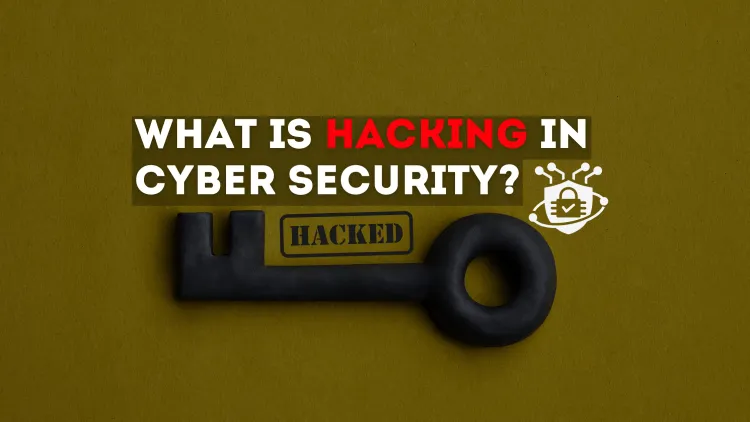What is Hacking in Cyber Security?
Hacking in cybersecurity refers to accessing systems without permission to steal, disrupt, or secure data. There are different types of hackers, ranging from ethical White Hats to malicious Black Hats. Common hacking techniques include phishing, malware, and brute force attacks. By understanding hacking and implementing preventive measures like strong passwords and updated software, individuals and organizations can reduce risks and enhance their cybersecurity defenses.

In cybersecurity, hacking refers to the process of gaining unauthorized access to a computer system, network, or digital device with the intent to steal, modify, or destroy data, disrupt services, or achieve other malicious objectives. While hacking is often associated with illegal activities, not all hacking is harmful—some hacking is done to strengthen security and protect systems from vulnerabilities.
Types of Hackers in Cyber Security
Hackers are categorized based on their intent and the legality of their actions. Here are the main types:
1. White Hat Hackers (Ethical Hackers)
- Purpose: Identify and fix vulnerabilities in systems.
- Methods: Conduct authorized penetration tests and audits.
- Contribution: Help organizations enhance their security posture.
2. Black Hat Hackers
- Purpose: Exploit vulnerabilities for personal gain or to cause harm.
- Methods: Use malware, phishing, or brute force attacks.
- Impact: Steal data, disrupt operations, or damage systems.
3. Gray Hat Hackers
- Purpose: Operate between ethical and unethical boundaries.
- Methods: May breach systems without permission but report vulnerabilities.
- Impact: Actions may lead to either improved security or unintended harm.
4. Script Kiddies
- Purpose: Seek attention or entertainment.
- Methods: Use pre-written scripts or tools without deep technical knowledge.
- Impact: Often cause minor disruptions but can lead to larger problems.
5. Hacktivists
- Purpose: Promote a political or social cause.
- Methods: Launch DDoS attacks or deface websites.
- Impact: Can disrupt services or spread awareness of issues.
6. Nation-State Hackers
- Purpose: Conduct cyber espionage or warfare.
- Methods: Sophisticated attacks targeting critical infrastructure or government systems.
- Impact: Can compromise national security or disrupt economies.
Common Hacking Techniques
1. Phishing
- Sending deceptive emails to trick users into sharing sensitive information.
2. Malware Infections
- Using malicious software like viruses, worms, or ransomware to compromise systems.
3. Brute Force Attacks
- Repeatedly trying different password combinations to gain access.
4. SQL Injection
- Exploiting vulnerabilities in web applications to access databases.
5. Man-in-the-Middle (MITM) Attacks
- Intercepting and altering communication between two parties.
Why is Hacking a Concern in Cyber Security?
Hacking poses significant risks to individuals, organizations, and governments, such as:
- Data Theft: Loss of sensitive personal or financial information.
- Service Disruption: Interrupting business operations or essential services.
- Financial Loss: Costs associated with recovery, legal fines, and reputational damage.
- National Security Threats: Compromising critical infrastructure or government systems.
How to Prevent Hacking?
1. Use Strong Passwords
- Create complex, unique passwords for each account.
- Use a password manager for added security.
2. Enable Two-Factor Authentication (2FA)
- Add an extra layer of security by requiring a second form of verification.
3. Keep Software Updated
- Regularly update operating systems and applications to patch vulnerabilities.
4. Install Antivirus and Firewalls
- Use reputable security tools to detect and block malicious activities.
5. Educate Employees and Users
- Conduct regular training on recognizing phishing attempts and other hacking tactics.
Comparison of Hacking Types
| Hacker Type | Intent | Legality | Common Actions |
|---|---|---|---|
| White Hat Hacker | Improve security | Legal | Penetration testing, vulnerability scans |
| Black Hat Hacker | Exploit vulnerabilities | Illegal | Data theft, malware deployment |
| Gray Hat Hacker | Mixed | Often illegal | Unauthorized vulnerability reporting |
| Script Kiddies | Cause minor disruptions | Illegal | Basic attacks using scripts |
| Hacktivists | Promote a cause | Illegal | Website defacement, DDoS attacks |
| Nation-State Hackers | Espionage or warfare | Often illegal | Infrastructure attacks, data breaches |
Conclusion
In cybersecurity, hacking is a double-edged sword. While unethical hacking poses a significant threat to organizations and individuals, ethical hacking plays a vital role in securing systems and protecting sensitive data. By understanding the different types of hackers, common hacking techniques, and preventive measures, individuals and businesses can better safeguard their digital assets and minimize risks.
FAQs
-
What is hacking in cybersecurity?
Gaining unauthorized access to systems to steal, disrupt, or protect data. -
What are the types of hackers?
White Hat, Black Hat, Gray Hat, Script Kiddies, Hacktivists, Nation-State Hackers. -
Is hacking always illegal?
No, ethical hacking (by White Hat hackers) is legal and helps improve security. -
What are common hacking techniques?
Phishing, malware infections, brute force attacks, and SQL injection. -
How can hacking be prevented?
Use strong passwords, enable 2FA, keep software updated, and install antivirus. -
What’s the difference between a hacker and a cracker?
Hackers explore systems (often ethically), while crackers break into systems for malicious intent. -
Why is hacking a threat?
It can lead to data theft, financial loss, service disruption, and security breaches. -
What is a penetration test?
A simulated cyberattack to identify vulnerabilities and improve security. -
What is social engineering in hacking?
Manipulating people into revealing confidential information. -
Can hacking be ethical?
Yes, ethical hackers work to identify and fix system vulnerabilities.











![Top 10 Ethical Hackers in the World [2025]](https://www.webasha.com/blog/uploads/images/202408/image_100x75_66c2f983c207b.webp)



![[2025] Top 100+ VAPT Interview Questions and Answers](https://www.webasha.com/blog/uploads/images/image_100x75_6512b1e4b64f7.jpg)







